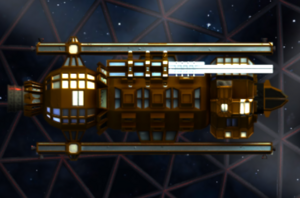No edit summary |
(added example image) |
||
| (One intermediate revision by the same user not shown) | |||
| Line 1: | Line 1: | ||
[[File:MPI Railgun Mk I.png|thumb|An MPI Railgun fitted to the left hardpoint of a K37]] | |||
==Description== | ==Description== | ||
A railgun relies on direct contact of the projectile with guiding rails to form an electrical circuit, inducing the electromagnetic force which accelerates the projectile. While this simple design offers great velocities and impressive rates of fire, friction lowers the power efficiency and it wears faster than coilguns. | A railgun relies on direct contact of the projectile with guiding rails to form an electrical circuit, inducing the electromagnetic force which accelerates the projectile. While this simple design offers great velocities and impressive rates of fire, friction lowers the power efficiency and it wears faster than coilguns. | ||
| Line 23: | Line 25: | ||
|- | |- | ||
|Mounting Location | |Mounting Location | ||
|High-stress | |High-stress, low-stress, low-stress spinal | ||
|- | |- | ||
|Mass | |Mass | ||
Latest revision as of 06:01, 15 October 2024
Description
A railgun relies on direct contact of the projectile with guiding rails to form an electrical circuit, inducing the electromagnetic force which accelerates the projectile. While this simple design offers great velocities and impressive rates of fire, friction lowers the power efficiency and it wears faster than coilguns.
User Manual
- Deals kinetic damage.
- Requires kinetic ammunition storage.
Technical Information
| Power Consumption (peak) | 800 MW |
|---|---|
| Projectile Mass | 2 kg |
| Muzzle Velocity | 7500 m/s |
| Rate of Fire | 10 pps |
| Mounting Location | High-stress, low-stress, low-stress spinal |
| Mass | 2000 kg |
| Manufacturer | Mars Power Industries |
